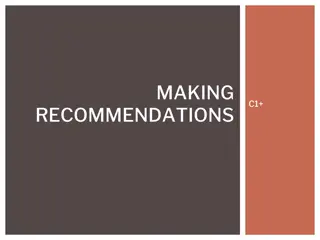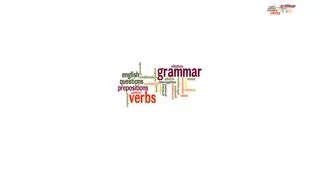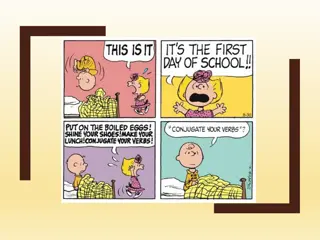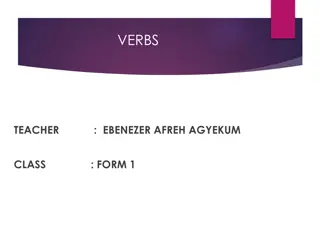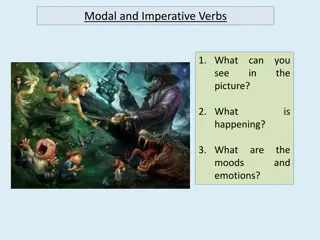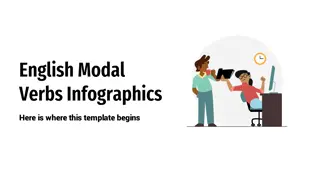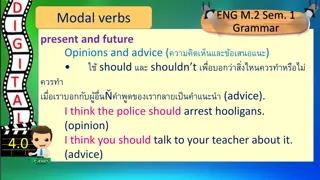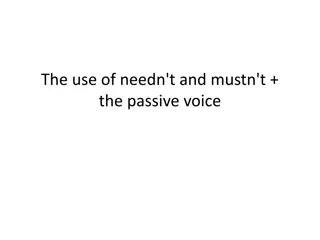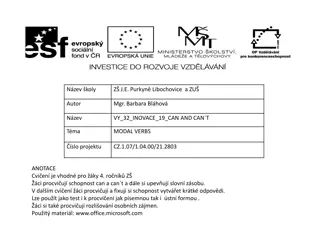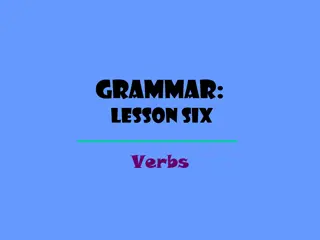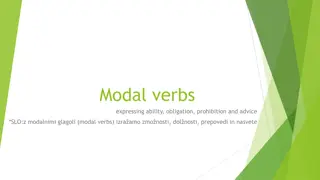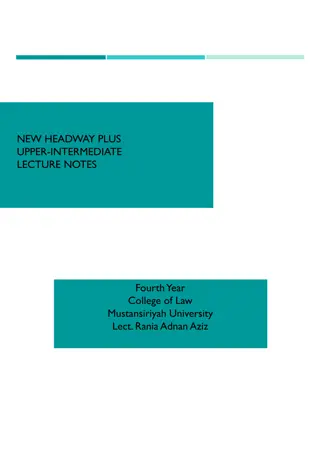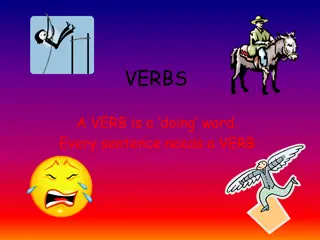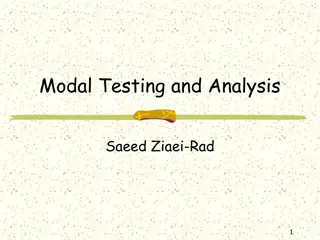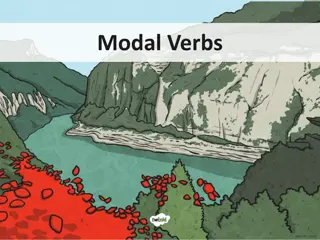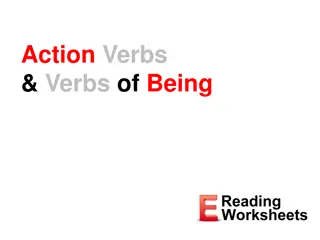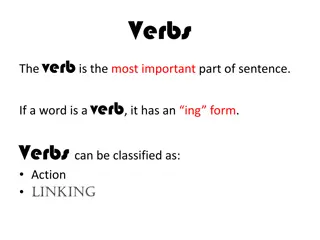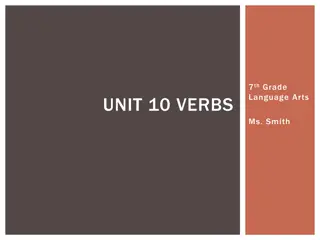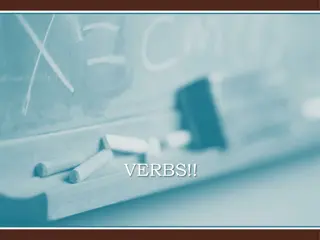Understanding Modal Verbs: Epistemic and Deontic Uses
Modal verbs, such as can, could, may, must, will, and should, play a crucial role in expressing modality in English. This content discusses the epistemic and deontic uses of modal verbs, illustrating how they convey likelihood, ability, permission, suggestions, obligations, and advice. Explore the nuances of modal auxiliary verbs and their relation to epistemic, deontic, and dynamic senses through practical examples.
Download Presentation

Please find below an Image/Link to download the presentation.
The content on the website is provided AS IS for your information and personal use only. It may not be sold, licensed, or shared on other websites without obtaining consent from the author. Download presentation by click this link. If you encounter any issues during the download, it is possible that the publisher has removed the file from their server.
E N D
Presentation Transcript
TURZM FAKLTES TUR ZM REHBERL TRH115 TEMEL NG L ZCE r. G r. Ya ar G LTEK N
Modals A Modal verb is a type of verb that is used to indicate modality that is: likelihood, ability, permission, suggestions, order, obligation, or advice. Modal verbs always accompany the base (infinitive) form of another verb having semantic content. request, capacity, In English, the modal verbs commonly used are can, could, may, might, must, will, would, shall, should, ought to, had better, have to and sometimes need or dare. In English and other Germanic languages, modal verbs are often distinguished as a class based on certain grammatical properties.
Modals A modal auxiliary verb gives information about the function of the main verb that it governs. Modals have a wide variety of communicative functions, but these functions can generally be related to a scale ranging from possibility ("may") to necessity ("must"), in terms of one of the following types of modality: epistemic modality, concerned with the theoretical possibility of propositions being true or not true (including likelihood and certainty) deontic modality, concerned with possibility and necessity in terms of freedom to act (including permission and duty) dynamic modality, which may be distinguished from deontic modality in that, with dynamic modality, the conditioning factors are internal the subject's own ability or willingness to act.
Modals The following sentences illustrate epistemic and deontic uses of the English modal verb must: epistemic: You must be starving. ("It is necessarily the case that you are starving.") deontic: You must leave now. ("You are required to leave now.") An ambiguous case is You must speak Spanish. The primary meaning would be the deontic meaning ("You are required to speak Spanish.") but this may be intended epistemically ("It is surely the case that you speak Spanish.")
Modals Modal auxiliary Epistemic sense Deontic sense Dynamic sense You can sing underwater. can That can indeed hinder. She can really sing. He could swim when he was young. could That could happen soon. - may That may be a problem. May I stay? - might The weather might improve. - - Sam must go to school. must It must be hot outside. - shall - You shall not pass. - should That should be surprising. You should stop that. - will She will try to lie. I will meet you later. - Nothing would accomplish that. We would eat out on Sundays. would -
LIST OF MODAL VERBS Can Could May Might Must Have to Shall Should Will Would Ought to They are Auxiliary verbs that provide additional and specific meaning to the main verb of the sentence Modal verbs are sometimes referred to as Modal Auxiliary verbs because they help other verbs
How do we use modals? S V Verb M Subject Example: Milo can play the piano -they are not conjugated - they don t need other auxiliary verbs
Form There is no s in singular There is no do / does in the question There is no don t / doesn t in the negative He can ski not Would you like to come with me? Do you would like to come with me? They can t be serious. They don t can be serious. He cans ski or He can skis.
Form Modal verbs do not have infinitives or ing forms to can / caning to must /musting Modal verbs are followed by an infinitive without to She must study. He could play football in his youth. (general ability) We should have gone the other way.
Form Modal verbs do not have all the tenses Many modals cannot be used with the past or the future tenses Can - be able to Must - have to I can solve the problem. I was able to solve the problem. You must come early. You had to come early yesterday.
Modals Modal Verb Expressing Example You must stop when the traffic lights turn red. He must be very tired. He's been working all day long. You must not smoke in the hospital. I can swim. Can I use your phone please? Smoking can cause cancer. When I was younger I could run fast. Excuse me, could I just say something? It could rain tomorrow! May I use your phone please? It may rain tomorrow! Strong obligation must logical conclusion / Certainty prohibition must not ability permission possibility ability in the past can polite permission could possibility permission possibility, probability may
Modals Expressing polite permission Modal Verb Example Might I suggest an idea? might possibility, probability I might go on holiday to Australia next year. lack of necessity/absence of obligation I need not buy tomatoes. There are plenty of tomatoes in the fridge. need not 50 % obligation I should / ought to see a doctor. I have a terrible headache. advice You should / ought to revise your lessons should/ought to logical conclusion He should / ought to be very tired. He's been working all day long. advice You 'd better revise your lessons had better
CAN 1) to express ability: Ryan can speak French but he cannot speak German. I can write a poem. 2) to express request: Can you help Sue? 3) to express permission: Can I use your cell phone? Can I say something? 4) to express possibility: If the weather is perfect tomorrow, we can go on a picnic. I can be late.
COULD to express abilities in the past: Jason could talk when he was four. to express permission: Could I leave the classroom? to express future possibility: I could get a bad final mark. It depends on the next exam. could with present perfect tense is used to express something in the past may be real. You could have been killed in that accident. I could have won that game. 1) 2) 3) 4)
SHALL 1) to express the simple future for the first person. Shall we meet at the bus stop? I shall never forget your help.
WILL 1) present to future tense: Sean will leave tomorrow. She will be back in a few days. If it rains, the soccer game will be put off. 2) express willing, If you won t go and help him, I will. I will wash the dishes if you cook.
WOULD 1) as the past tense of will: She said she would buy dinner on her way home. I believed it would rain so I brought my raincoat. 2) to express polite request: Would you please take off your coat? Would you mind turning the radio off?
SHOULD 1) to give advice and opinions You are driving too fast; you should slow down a little bit. You have gained a lot of weight. You should go on a diet. 2) to express expectations: Are you ready? The taxi should be here soon. Twenty dollars is enough. It shouldn t cost more than that. 3) to suggest a less strong possibility If you should pass the bakery, can you buy some bread? Should with present perfect tense means something in the past should not be done. The baby is crying. You shouldn t have talked so loudly. She is angry. You shouldn t have come back so late.
MUST and HAVE TO 1) express something is necessary and essential You must pay by cash. You have to drive on the right in France. 2) Students have to wear uniform. must not is used to express something is not permitted or allowed. You mustn t smoke, eat and drink in the museum. You must not drink and drive. 3) not have to is used to express something that is not to be done necessarily. We don t have to get up early on Saturday. She doesn t have to live in the hotel. She can live with us.
MAY 1) express possibility in the present or in the future. It may rain. Elizabeth may know his telephone number. 2) for permission: May I come in? You may come if you want. 3) to express wish or hope. May you a long life!
MIGHT 1) to express possibility in the present or in the future. Ashley might be in the library. I am not sure. George might come as well. He may come. He might come. (the chance that he comes is less likely than may) 2) might with present perfect tense means speculation about the past. Edward is late. He might have missed his bus or he might have overslept.
Past Modals These past modal verbs are all used hypothetically, to talk about things that didn't really happen in the past.
Past Modals 1: Could have + past participle means that something was possible in the past, or you had the ability to do something in the past, but that you didn't do it. I could have stayed up late, but I decided to go to bed early. They could have won the race, but they didn't try hard enough. Julie could have bought the book, but she borrowed it from the library instead. He could have studied harder, but he was too lazy and that's why he failed the exam.
Past Modals Couldn't have + past participle means that something wasn't possible in the past, even if you had wanted to do it. I couldn't have arrived any earlier. There was a terrible traffic jam (= it was impossible for me to have arrived any earlier). He couldn't have passed the exam, even if he had studied harder. It's a really, really difficult exam.
Past Modals 2: We use could have + past participle when we want to make a guess about something that happened in the past. In this case, we don't know if what we're saying is true or not true. We're just talking about our opinion of what maybe happened. Why is John late? He could have got stuck in traffic. He could have forgotten that we were meeting today. He could have overslept. We can also choose to use might have + past participle to mean the same thing: He might have got stuck in traffic. He might have forgotten that we were meeting today. He might have overslept.
Past Modals 1: Should have + past participle can mean something that would have been a good idea, but that you didn't do it. It's like giving advice about the past when you say it to someone else, or regretting what you did or didn't do when you're talking about yourself.
Past Modals Shouldn't have + past participle means that something wasn't a good idea, but you did it anyway. I should have studied harder! (= I didn't study very hard and so I failed the exam. I'm sorry about this now.) I should have gone to bed early (= I didn't go to bed early and now I'm tired). I shouldn't have eaten so much cake! (= I did eat a lot of cake and now I don't feel good.) You should have called me when you arrived (= you didn't call me and I was worried. I wish that you had called me). John should have left early, then he wouldn't have missed the plane (= but he didn't leave early and so he did miss the plane).
Past Modals 2: We can also use should have + past participle to talk about something that, if everything is normal and okay, we think has already happened. But we're not certain that everything is fine, so we use 'should have' and not the present perfect or past simple. It's often used with 'by now'. His plane should have arrived by now (= if everything is fine, the plane has arrived). John should have finished work by now (= if everything is normal, John has finished work). We can also use this to talk about something that would have happened if everything was fine, but hasn't happened. Lucy should have arrived by now, but she hasn't.
Past Modals Would have + past participle 1: Part of the third conditional. If I had had enough money, I would have bought a car (but I didn't have enough money, so I didn't buy a car).
Past Modals 2: Because 'would' (and will) can also be used to show if you want to do something or not (volition), we can also use would have + past participle to talk about something you wanted to do but didn't. This is very similar to the third conditional, but we don't need an 'if clause'. I would have gone to the party, but I was really busy. (= I wanted to go to the party, but I didn't because I was busy. If I hadn't been so busy, I would have gone to the party.) I would have called you, but I didn't know your number. (= I wanted to call you but I didn't know your number, so I didn't call you.)
Must vs. have to Both must and have to express obligation or necessity, but there are some small differences: Must expresses the speaker's feelings, whereas have to expresses, above all, an impersonal idea: You must come. You are obliged to come (I require that you come) You have to come. You are obliged to come. (There's a rule requiring you to come) Must I wear this tie? Am I obliged to wear this tie? (What do you think?) Do I have to wear this tie? Am I obliged to wear this tie? (Is there a rule about ties?) Have to mainly expresses general obligations, while must is used for specific obligations: I have to brush my teeth twice a day. I must tell you something.
Must vs. have to Important: To express obligation, duty or necessity in the future or the past, must and need are not used. They are replaced by have to: We must (need to) buy another ticket. We had to buy another ticket yesterday. We'll have to buy another ticket later. However, in their negative forms, mustn't and don't have to have completely different meanings: Mustn't expresses prohibition You mustn't drive. You are prohibited to drive. You are not allowed to drive. Don't have to expresses the absence of obligation or necessity: You don't have to drive. You are not obliged to drive (but you can if you want to).
Resources https://www.gymglish.com/en/gymglish/english-grammar/must-vs-have- to https://www.perfect-english-grammar.com/modal-verbs.html https://www.perfect-english-grammar.com/could-have-should-have-would- have.html



